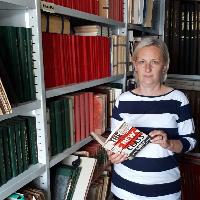The Archive of the Opposition to the GDR, founded by the Robert-Havemann Society, is the largest and most significant amongst the so-called ‘reappraisal archives’. With its impressive collection of personal documents, the Archive offers a wealth of alternative and contrasting source material to that found in state and party files.
-
Vieta:
-
10437 Berlin Schliemannstraße 23 , Germany
-
Temos:
-
Įkūrimo data:
-
Charakteringi eksponatai:
The Collection of Historical Interviews is one of the most significant oral history collections in Hungary. It is a mixed collection of life story interviews that were done with the intention of creating materials for oral history narratives, and a lot of the archived interviews were conducted during the production of historical documentaries beginning in the 1960s. The latter usually cover one aspect or chapter in a person’s life. The materials constitute a particularly useful source for the study of the history of Hungarian television. However, the scope of the collection is such that it contains a lot of references to figures of the cultural opposition. The history of the collection itself represents a narrative of nonconformist cultural practices.
-
Vieta:
-
Budapest Szent György tér 4-5-6., Hungary 1014
-
Temos:
-
Įkūrimo data:
-
Charakteringi eksponatai:
The collection includes Croatian State Security Service's file on the case of first and best known Yugoslav dissident, Milovan Djilas, and its reception in Croatia. During 1953, Djilas published a series of articles in the newspaper Borba on the need for democratization and liberalization of Yugoslav society, which led to his condemnation at Party forums and expulsion from the League of Communists of Yugoslavia. In Croatia, similar ideas were mainly manifested in the weekly Naprijed, the official newspaper of the Communist Party of Croatia. It led to open conflict with Party leaders and the suppression of the newspaper, while its journalists were forced to halt their careers in journalism. The collection includes different analysis and reports on operational measures conducted by the Croatian State Security Service against the Naprijed group and other Djilas supporters (Djilasovci) in Croatia until the beginning of 1960s.
-
Vieta:
-
Zagreb Trg Marka Marulića 21, Croatia 10000
-
Temos:
-
Įkūrimo data:
-
Charakteringi eksponatai:
The collection of the D-fund of Prohibited Literature (1945-1991) is located in the National and University Library in Ljubljana and forms an integral part of the Slovenian Press Collection Outside of the Republic of Slovenia. The D-fund mostly contains books and periodicals published outside of socialist Yugoslavia and those primarily pertaining to the Slovenian émigré scene. However, a smaller part of the same fund encompasses the émigré literature of other Yugoslav peoples. In this sense, the D-fund also belongs to the culture of dissent.
-
Vieta:
-
Ljubljana Turjaška ulica 1, Slovenia 1000
-
Temos:
-
Įkūrimo data:
-
Charakteringi eksponatai:
The Edvard Kocbek Collection is located in the depot of the National and University Library in Ljubljana. It is actually his personal bequest to that same library. Kocbek was the greatest Slovenian poet and writer of the 20th century, who, as a Christian Socialist, joined the Slovene National Liberation Front under the control of the communists during the Second World War. Due to his divergent opinions about the war and the policies of the new communist regime, immediately after the war he was placed under the surveillance of the secret police (known as the UDBA). After that, he was very soon placed under a kind of public isolation, which implied limited movement and restricted access to intellectual life.
-
Vieta:
-
Ljubljana Turjaška ulica 1, Slovenia 1000
-
Temos:
-
Charakteringi eksponatai:





